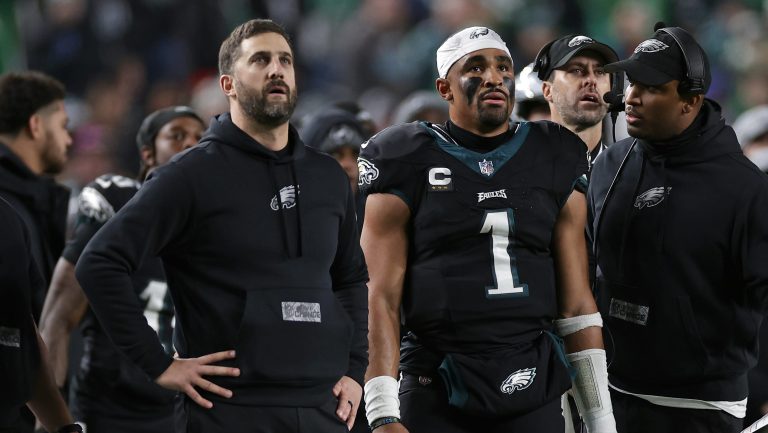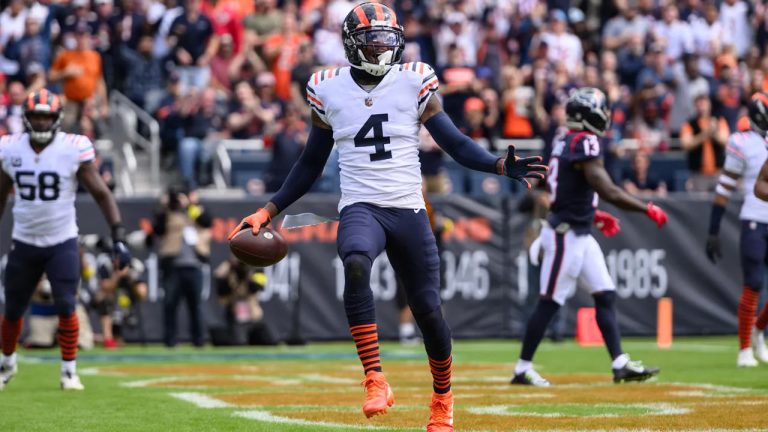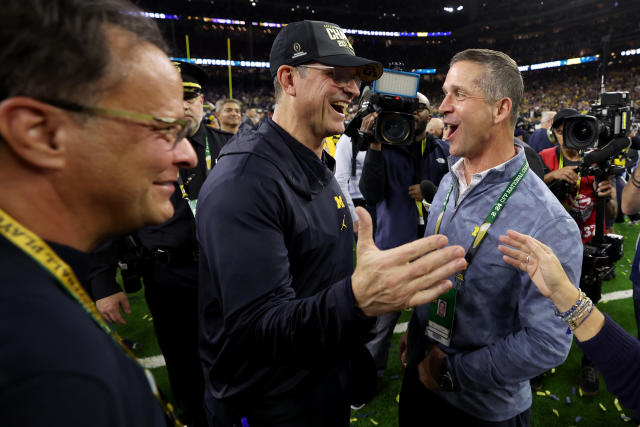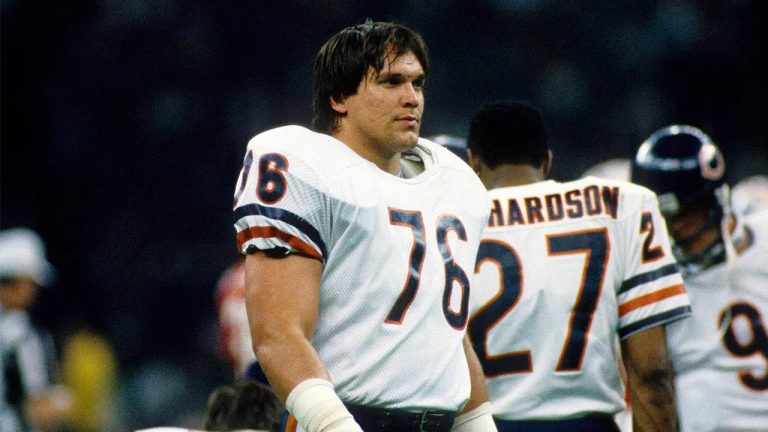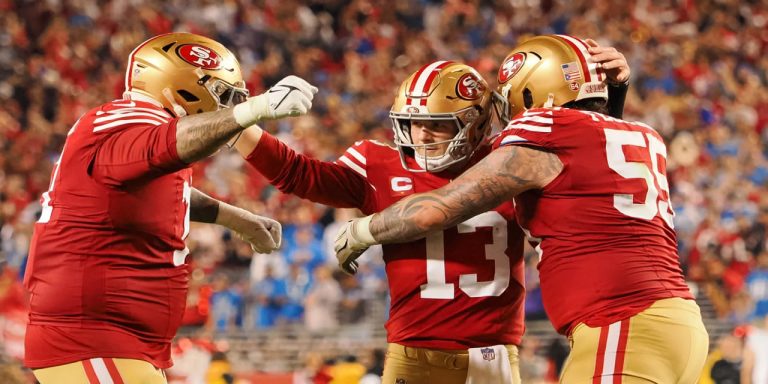Dan Campbell and the Detroit Lions stick to their strategy despite failed fourth-down attempts that dashed Super Bowl aspirations.
In Santa Clara, California, Dan Campbell approaches fourth downs in a distinctive manner, diverging from the conventional perspective in football. This unconventional approach tends to unsettle and sometimes infuriate people, leading to critical judgments if the outcomes aren’t favorable.
Latest American Football League Scores & Updates.
Acknowledging the scrutiny, Campbell stated, “I understand the scrutiny. It’s part of the gig.”
During Sunday’s NFC championship game, the Detroit Lions, led by Campbell, found themselves in two fourth-and-short situations within field-goal range. In both instances, a successful kick could have either restored a 17-point lead or tied the game. However, Campbell didn’t hesitate in his decision; he was determined to go for it on both occasions.
Regrettably, the San Francisco 49ers managed to stop the Lions on both attempts.
These decisions occurred as the Lions squandered a substantial halftime lead, witnessing the collapse of their enduring Super Bowl aspirations. They transpired amidst the fleeting belief among Detroit fans that victory might just be within reach, only to be met with the painful realization that hope can be a perilous thing.
The final score was San Francisco 34, Detroit 31, with confetti and celebration belonging to the opposing side. While Niners fans were making travel plans to Vegas, Lions fans were left in gut-punch disbelief.
Critics argue that Campbell should have opted for field goals to halt the momentum or tie the game. Detractors assert that Detroit’s fate wasn’t solely determined by those unsuccessful fourth-down attempts, but they certainly didn’t contribute positively. Both decisions were bold, a quality celebrated only when it succeeds. However, Campbell, known for his consistently aggressive approach, believes it’s the way the game should be played. He sees it as possibly the only method to transform a perennial underperformer like Detroit into a team that came within three points of reaching the Super Bowl. Specifically, he views it as the only strategy to defeat a favored No. 1 seed on the road in such a crucial game.
“I just felt really good about us converting,” Campbell remarked in the aftermath.
While the analytics may have slightly favored his decisions, Campbell wasn’t driven by the math; he was focused on the dynamics of the game. Recognizing that Detroit’s offense outshines its defense, the game plan consistently revolves around relying on Jared Goff and the offensive unit to secure victories.
Regarding the second crucial fourth down, where tying the game at 27 was an option with 7:03 remaining, Campbell’s perspective diverged from the conventional notion of safety and smart play. He saw it as an opportunity to prevent the Niners from controlling the clock in the late stages of the fourth quarter and securing a lead with just a field goal. Campbell believed that maintaining a tie would give the San Francisco offense, which Detroit was struggling to stop, the chance to play with little pressure and urgency. He wasn’t wrong about the potential risks involved. Had Detroit converted, scored a touchdown, and taken a four-point lead, the entire dynamic of the game would have shifted.
“It’s about not letting them play long-ball,” Campbell explained. “They were bleeding the clock out. That’s what they do. I wanted to get the upper hand back.”
After the game, San Francisco head coach Kyle Shanahan acknowledged that it would have been challenging for his team if Detroit had successfully converted the fourth-and-2. He admitted that he wasn’t surprised by Campbell’s aggressive approach, stating, “… That’s how they’ve done it most of the year. That’s why they are here. They won a lot of games making those decisions.”
Campbell, in response, expressed regret only about the plays not succeeding, not about attempting them in the first place. He acknowledged the ease of critiquing decisions in hindsight but emphasized that he doesn’t regret those choices. Despite the challenges and the ultimate lack of success, Campbell maintained that making those decisions was difficult, stating, “It’s hard because we didn’t come through. We weren’t able to make it work out.”
However, the issues Detroit faced in the second half extended beyond the unsuccessful fourth-down conversions. Dropped passes, missed tackles, an inability to down a punt inside the 5, fumbles, penalties, a failed flea flicker, and multiple successful Brock Purdy scrambles all contributed to the team’s struggles.
While Detroit enjoyed a favorable first half where everything seemed to go their way, the dynamics shifted in the second half. The team that initially took the stage throwing powerful punches found itself on the defensive. San Francisco capitalized on every possession after halftime, excluding when Purdy took a knee as time expired.
In reflection, wide receiver Josh Reynolds attributed the second-half challenges to a “lack of execution.” The game that initially favored Detroit now tilted in the opposite direction. Quarterback Jared Goff acknowledged the turning point, stating, “Momentum changed. They scored, we didn’t convert the fourth down, they scored again, we turned the ball over…”
Perhaps, in the future, deep into Campbell’s coaching career, he might come to embrace the idea that sometimes it’s necessary to ease off the intensity and opt for field goals just for the sake of it. Maybe not.
However, that’s not his coaching philosophy at present, and his current approach fueled the entire remarkable turnaround that saw Detroit progress from a 1-6 start in the 2022 season to the verge of greatness just 14 months later. In Campbell’s view, football games aren’t won passively but are actively seized. Super Bowls aren’t merely handed out; they are earned. To overcome experienced and star-studded teams like the Niners, Campbell believes in delivering decisive blows that drive a stake through their hearts.
While Detroit may face defeat, it won’t be due to a lack of aggression.
“I love it,” remarked Goff. “We’ve got to convert … He believes in us. I don’t know what the numbers are, but we had a lot of big-time conversions this year that changed games.”
However, none of this comforted Campbell postgame. A coach who openly displays his emotions, he expressed despondence, stating, “It feels like you got your heart ripped out.”
His appearance suggested that something even more dire had occurred. In a locker room permeated by hushed conversations and vacant gazes, the sentiment was consistent. Nevertheless, at least this team exited the competition with a fighting spirit, irrespective of the criticism regarding their fourth-down decisions.
While the mindset might be perplexing to others, it remains unwavering in Detroit.


